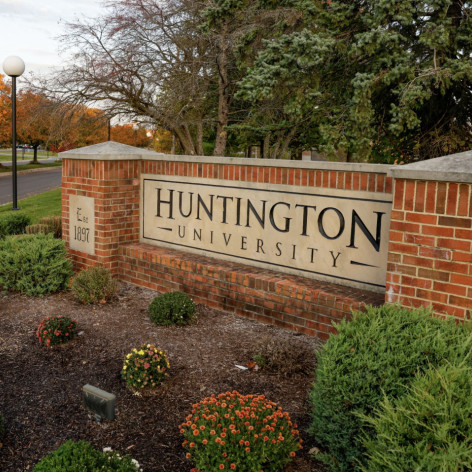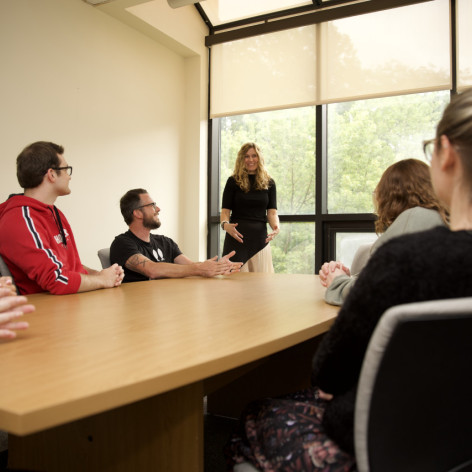Counseling class assists with community interventions
FOR RELEASE: Thursday, July 23, 2009
Huntington, Ind.-The Huntington University graduate counseling program seeks to do more than teach students counseling skills but also to equip them to make a difference in their communities. A course in the foundations and contextual dimensions of mental counseling requires students to identify a need in their community and then meet that need. "When I was planning for the class, I wanted our students to begin to catch a vision for how we could be salt and light in our communities," said Dr. Jerry Davis, director of the graduate counseling program. "I told the students to think and pray about an underserved population or need in their communities."
The options were nearly limitless, though student Hope Brown knew exactly what she wanted to do.
Brown lives near one of the Huntington city parks that participates in the SPARK program (Summer Parks And Recreation for Kids). SPARK ran for six weeks, from June 22 to July 24, and children were dismissed for hour to go home and eat lunch. Brown began noticing that some of the children stayed at the park over the lunch hour instead of going home to eat. Others would eat at the park, but their lunch would consist of a Pop Tart or a bag of chips, she said.
The assignment was "to find a need in the community and find ways to meet it," Brown said. Knowing that her goal was a large project, Brown opted to partner with friend and fellow classmate, Katie Razor of Huntington. Together, they chose two parks in Huntington as their focus. Their goal was, with the help of volunteers, to offer free lunches to any child who needed them.
"We really didn't know how we were going to make lunches on our own so we used the contacts that we had with our churches and also the university," Brown said. "The response was amazing."
A few days after the request for volunteers and food was sent, six churches had replied that they were willing to participate, including four that were willing to coordinate food donations, food preparation and the delivery of lunches.
The first week of the free lunch program for the children was a success with 40 to 48 lunches made each day. Brown and Razor hope to expand next year to include more parks that participate in the SPARK program and to encourage involvement from additional churches.
Not all of the community intervention projects involved children or were weekly events. Some were one-time events affecting a more focused group of people. Kyna Steury-Johnson of Fort Wayne found herself drawn to a project that would impact a large number of people.
Inspired by the newspaper publicity generated about the proposal for the building of Charis House in Fort Wayne, Steury-Johnson decided to dig deeper. Charis House is a branch of Rescue Mission Inc. that focuses on women and children. The controversy was over the location of the new Charis House, which was approved for Wells Street. With the project under way, Steury-Johnson made contact with Rescue Mission Inc.
"With a project this big," Steury-Johnson said, "their biggest need is money. So I decided to work with the fundraising process."
Prior to her graduate school work, Steury-Johnson was a restaurant and catering manager. She now hopes to use those skills as she works with the Cinderella Ball. The Cinderella Ball is a fundraiser that chooses different charities each year to donate their event proceeds to, and this year, Charis House was one of the charities chosen. The Cinderella Ball is an event for dads and their young daughters and consists of dinner, a carriage ride and ballroom dance lessons. The fundraiser will take place in February 2010.
Student Lisa Wanner of Berne tackled a project geared toward the parents of adolescents.
Wanner is a case manager for Life Matters Counseling, a division of Youth for Christ, and through the course of her work, she noticed how the same issues within families kept popping up. Families with whom she worked seemed to have similar problems that she felt could be addressed together.
With this thought and funds provided by a grant, Wanner began the planning process to put together a parenting class for the parents of adolescents, specifically those parents whose children are part of the Mental Health Services program, a program that focuses on counseling, family therapy and case management.
Wanner pitched the idea to Amy Biegel, director of Life Matters Counseling, who was supportive, and together Wanner and Biegel presented the idea to two schools within Adams County.
The principals for both South Adams and Adams Central high schools were thrilled with the idea of a parenting course and agreed to allow their schools to be part of the program. These two schools were chosen because Life Matters Counseling already has relationship with them, though Wanner said she hopes that the program can branch out to include elementary schools as well.
The purpose of the one evening, two-hour class is to educate parents about new ways to communicate with their teenagers. Confrontation and consequence-setting are typical trouble areas for parent-teen relationships, so Wanner and Beigel hope to offer suggestions in those areas.
Wanner's heart is in this project because she has seen firsthand the relationships struggles of families she counsels and because she knows how much Adams County needs to help and support its teenagers.
According to journal articles that Wanner consulted when developing this idea, research confirms that educating parents and teaching them better skills in communication can greatly reduce the risk of teenage delinquency. Also, what she discovered was that 42 percent of Adams County juniors and seniors reported use of alcohol within a 30-day period in a study done in 2007. This statistic hit home even harder for Wanner when she discovered that Adams County is ranked second in Indiana for the highest percentage of a population under that age of 18 and that 20 percent of those youth are living in poverty.
"We are just a bunch of graduate students," Wanner said, "but I think through this graduate course, we can make a difference."
Opening in the fall will be a free counseling clinic in Huntington and the surrounding communities. Davis said that this is just another wonderful example of providing community services to strengthen individuals and families.
For more information about Huntington University's graduate counseling program, call (260) 359-4129.



